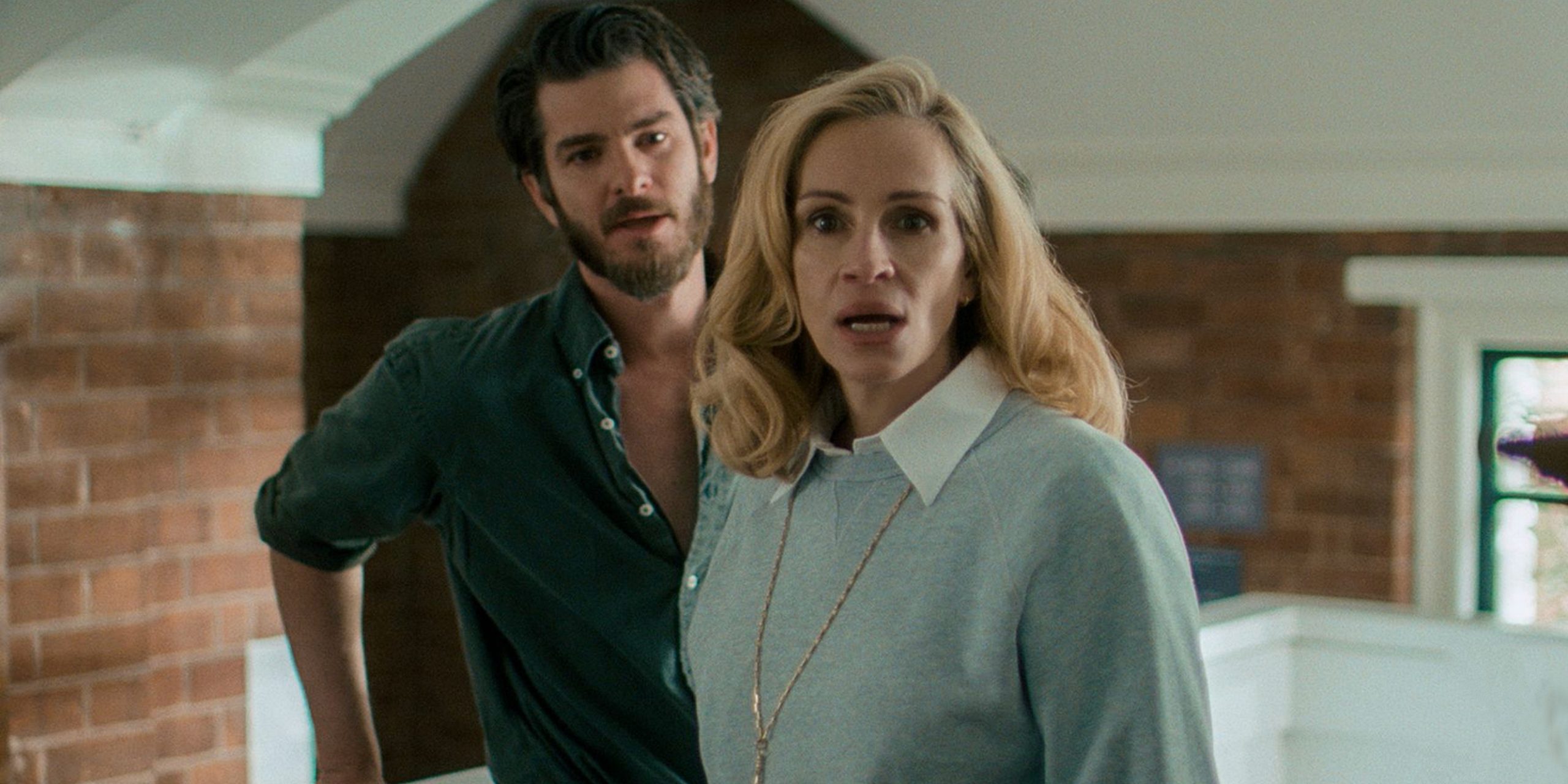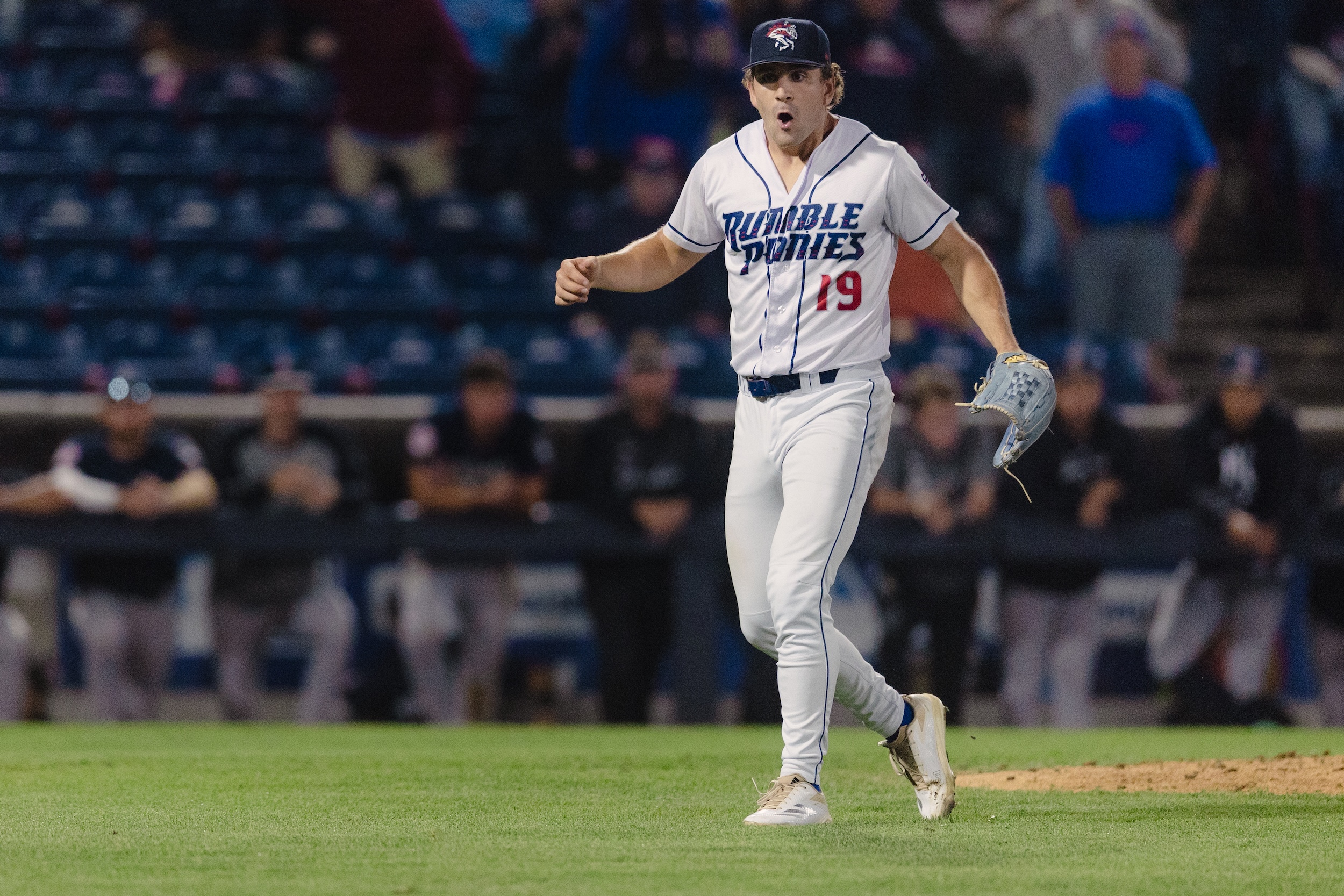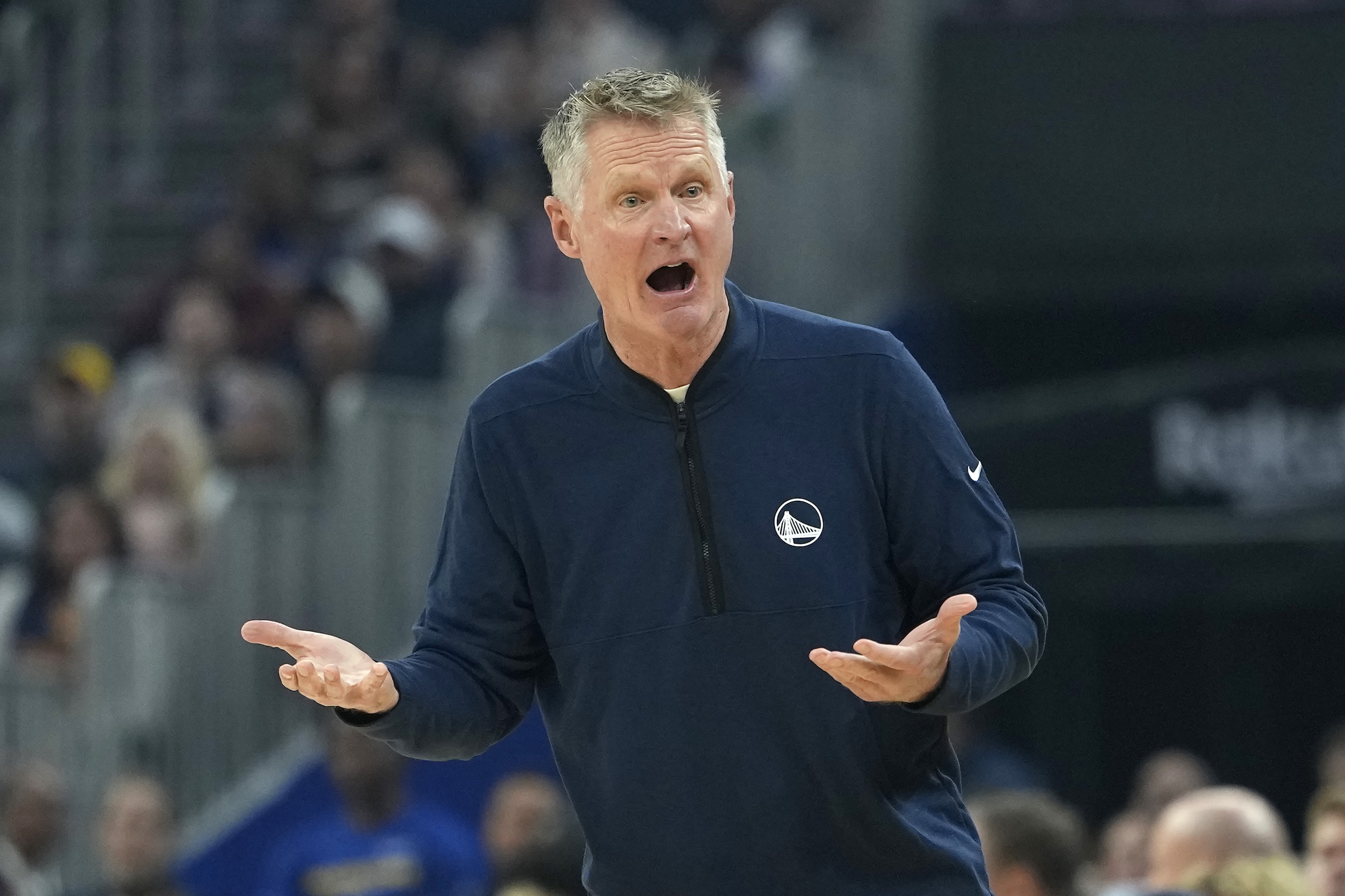After the Hunt, the latest film from Luca Guadagnino, is ostensibly about a great many things. It is a film about campus politics, generational divide, the slippery nature of power dynamics, fantasy kitchen apartments, and whether you can be too much of a wife guy. But After the Hunt is mostly incoherent—a film that wants to embrace thorny topics but does so in service of online discourse rather than a good story. It is also a movie that was once highly anticipated but became absolutely hypeless through the combination of mixed reviews and bad marketing strategy.
I barely know how to talk about any of it. If this movie was straightforwardly bad, you could just ignore it, but it's too well-made and has too many good actors for that to be the case. If it was fully bonkers, it would be a lot more fun. Instead, you have a scattershot project dirtied by all the mud it's trying to wade through. Rather than review it straight, I asked another Defector writer to watch it so we could talk it out together and maybe get to some kind of conclusion with this film.
Israel Daramola: Kelsey, I asked you to watch this movie that you did not really know anything about for a couple reasons. I think After the Hunt is a mess, but still an interesting artifact that is better to discuss than it would be to just review. Also, as our queen of gossip, this is a movie that tries to engage with the way stories and accusations can become runaway trains. At least, I think that’s what it’s going for. Kelsey, give me your first thoughts about this movie.
Kelsey McKinney: I went to the theaters to see this movie only because you asked me to. Otherwise, I had heard nothing about it. I had not seen a preview. I had not seen any press. This is strange. Usually, I feel like I am aware of a movie with as many stars as this movie has—Julia Roberts, Ayo Edebiri, Andrew Garfield, Michael Stuhlbarg, and Chloë Sevigny! So I went to see it, knowing nothing, and left the theater in a daze where I felt like somehow I knew even less than before. My first thought is that I loved the soundtrack. I am, for better or worse, a Trent Reznor and Atticus Ross–head, so it was a delightful surprise for me to find them there. But for the most part, I felt like it was a bad, boring ripoff of Tár!
Israel: I do want to get to the Tár-ness of this movie in just a second. The first thing I want to ask is ... what would you personally say this movie is about?
Kelsey: I think the movie thinks it is about “truth” and “gray spaces” and “class.” I think the movie is actually about a really beautiful apartment and very close shots of people’s faces when they are upset. But I know so much less about movies than you do. What would YOU say this movie is about?
Israel: The first thing I should say is that this movie is directed by Luca Guadagnino. He has sort of become the patron saint of late millennial/Gen Z cinema in a strange way: He made Call Me by Your Name, Challengers, and the Timothee Chalamet movie where he’s a sexy cannibal-vampire or whatever. And I think that this campus-politics film is his attempt to dramatize and reckon with the generational divide between how young people see the world and how their parents and (in this case) teachers see it. Which might have been really provocative if this movie came out three years ago instead of now.
Kelsey: I don’t generally dislike Guadagnino. I know there are people who really dislike him, but I love his remake of A Bigger Splash that came out in 2015 and stars my queen Dakota Johnson. I didn’t mind Challengers or Call Me by Your Name, either. It’s interesting to me that he’s so focused on closed environments with tight groups of people in them. In that way, it makes sense to me that he would want to do a campus film. Campuses are inherently full of conflict and are also small worlds that feel like everything to the people who occupy them. It’s worth noting, too, that the campus is Yale. After the Hunt is set in the most hallowed of halls: the Ivy League. But I completely agree with you. It felt extremely dated and like it had no idea what kind of conversations have happened in the last five years. Granted, the movie is set in 2019, but I don’t think that’s a good reason for the tone itself to feel dated.
Israel: Let’s talk for a second about what actually happens in the movie. Julia Roberts plays a Yale professor named Alma Imhoff who is on a tenure track alongside her one-time mentee Hank, played by Andrew Garfield. The movie opens with a dinner party at her extremely unattainably beautiful apartment with the two professors and their grad students in attendance, including Imhoff’s protege I guess, Maggie Resnick (played by Ayo Edebiri). Both Hank and Maggie leave the party together, and it's implied that he offers her a ride home, or maybe just walks there with her. The next morning, there’s an indication that something bad happened between them in her apartment. Maggie goes to Alma and tells her just that, saying that he crossed a line, and a lot of this movie is just about no one really knowing what they should do with this information, or even whether they believe it.
Kelsey: This might sound like an opening sequence, but to be clear, this takes what feels like at least 45 minutes to happen. Another thing to note here is that all of these people are philosophy professors and students. Specifically (though not entirely and not consistently) they are focused on moral philosophy. The movie’s opening sequence shows Alma sitting in a classroom with “What determines the moral worth of an action?” written on the board. "Moral worth" is underlined. So it’s very subtle, I would say!
Israel: Yes, that’s right, because what would a movie like this be if people couldn’t talk moral philosophy at each other?
Kelsey: After the Hunt was written by debut screenwriter Nora Garrett. It is unclear to me if she does not know very much about moral philosophy, or if she tried to keep it relatable for audiences, but the way that these philosophers talk about moral philosophy never feels very Yale Academic. I think this movie could have done better if it had leaned even harder into some of the hallmarks of moral philosophy instead of just saying “Foucault's panopticon" six times.
Israel: Well, speaking of not feeling very Yale, Edebiri's character is at the center of the movie and the scandal. Maggie Resnick—a name that totally indicates this was a character written for a black person—and the distrust around her account and around her as a person, we find out, is because she is the daughter of extremely rich patrons to the school, and it is heavily implied that she only got into the philosophy program in the first place is because everyone is placating her family—and also she may or may not have plagiarized her entire thesis. I get this whole thing as an attempt to complicate the power dynamics between everyone, but it ends up sort of standing in for the movie as a whole: too muddy to make any sense of after a while.
Kelsey: It doesn’t really work because the dynamics still aren’t that muddy. If you’re a professor, it’s your job to discipline a student who plagiarizes, especially in grad school. But the movie doesn’t show them doing this, or even being prevented from doing this. The whole movie is a lot of people who seem to be interested professionally in moral philosophy not really thinking at all about what their actual moral obligations in the world should be. Which, again, could be interesting and thought-provoking if it were better written and the characters had any depth.
Israel: The other thing about Maggie is that she’s barely a person? She seems to walk around like a baton for other characters to wave around for their own purposes. It’s implied that she’s so infatuated with Alma that she has always done or said whatever to be in her good graces. It’s implied that she is only at this school because of her very rich family. It’s implied that her non-binary partner wants her to be a political tool and use her trauma as some sort of flag against the school and society. And I guess I can understand a character who is young being in that position of not knowing what to do with themselves, but (and I think this is where Ayo is most miscast) there doesn’t seem to be any interiority to the performance at all.
Kelsey: I actually felt this way about almost all of the characters. We are told a lot and shown nothing. We are told that Alma and Hank both want tenure, but they both sabotage themselves pretty quickly and without thinking much about it. It is entirely unclear, the entire movie, what anyone wants at all. This is a huge failure of writing and a shame because I do think the performances by all of these actors are quite good and could be better if they had more to work with. Every character is just a stand-in for something. Ayo in particular is given an almost impossible role because the movie is obsessed with muddiness. Everything could be anything! But the problem with that is true muddiness comes from specificity. We need to know what a character wants and believes about themselves in order to understand how they contort that for their own gain.
Israel: We have to talk about what Andrew Garfield is doing in this movie.
Kelsey: Besides his sultry stare?
Israel: Well, I remember in the moment thinking, “Oh wow you really are just so not this guy, are you?” Sometimes you have actors playing very rough or mean archetypes, and they insist they’re nothing like the character but in your mind you’re like, “Yeah, but you’ve got a little bit of that in you.” With Garfield, it’s the total opposite.
Kelsey: I feel like this is another failure of the writing, to be honest. I really bought the chemistry between Andrew Garfield and Julia Roberts. That was almost palpable for me. And I think in a more subtle movie that was a little less concerned with how it was going to be received, he might have been able to play this role of a man who is violent to women he feels are taking things that belong to him in a much softer way. This character could have been so nice and so calm the whole movie, and that could have made it work better because it would have been more complicated. Instead, we have him screaming at Julia Roberts in a hallway, and his big-ass face is taking up the whole screen, and it just doesn’t feel scary at all. It’s a kind of juvenile understanding of how violence works.
Israel: I guess what I mean is, this sort of swaggering machismo he’s trying feels like affectation. It's like a really on-the-nose parody of a type of guy: I’m gonna take up all the space and have every button on my shirt unbuttoned very carefully and exotically. I am the most sexual man.
Kelsey: Yeah, you’re right. You’ve convinced me. Like, you can imagine Skarsgard really killing that. Or Armie Hammer.
Israel: That’s the shocking thing about this movie—how much of it feels obvious and overdone for a film by a really good director and really good actors.
Kelsey: Making a very simple and cliched story a little bit muddied up is not the same as telling a story that is morally ambiguous and complicated! One thing I want to bring up here is that Andrew Garfield’s character literally has an ouroboros tattoo wrapped around his forearm in a scene where he also not only references the ouroboros, but then specifically explains what an ouroboros is to the viewer: a snake eating its tail. Like, who is this movie for?! The tattoo would be so fun and interesting if it were just there.
Israel: So I saw this at the New York Film Festival, and Luca and the cast were there, and he went on a whole thing about how sad he is at the state of communication right now and this desire everyone has to shut themselves off from discussion, hard questions and all that sort of nonsense that everyone keeps saying. And I think the biggest problem with this movie is that it does feel like a bar argument or a newspaper op-ed turned into a film. It compares negatively to Tár, which is a true character study about a person going from having too much power to having none of it, and gets many of the same points across much more effectively, especially in the way young people figure into both movies.
Kelsey: OK, thank god. We can talk about Tár now. The biggest difference to me in what makes Tár work is that we as the audience know what Lydia Tár wants: She wants to be the best conductor alive, and she will stop at nothing to get it. Everyone is a stepping stone for her, and anyone who gets in her way is dead. That is because her moral core (which you would think would be a big part of a movie about moral philosophy) is that art matters more than people. You can disagree with that (you probably should disagree with that), but it’s coherent. Tár is not afraid to make its main character the villain. She is so clearly the villain. She is a beautiful, brilliant villain who is also older than the students she is teaching and puts her foot in her mouth and it destroys her. But Alma Imhoff has none of that drive, none of that ferocity. She’s just mean sometimes for no reason.
Israel: And when Lydia chastises her students for caring about the morality of their favorite artists, even if you agree somewhat, you do on some level understand she is being an asshole, where here it feels like Alma is acting like an asshole but is ultimately seen as correct.
Kelsey: I keep thinking about one strange parallel between Tár and After the Hunt—besides the tailored blazers—which is their weird second apartments. On my walk home from the movie, this was all I could think about, because it felt too weird to be an accident. But also, that kind of parallel makes it really clear why Tár succeeds where After the Hunt doesn’t. In Tár, Lydia has an old apartment from when she was early in her career, where she goes to work on the piano. It is clear that she keeps this space because she believes there is some creative magic there, but also because it is very convenient to have a second apartment when you are the kind of famous person who has affairs. The space also shows us a version of Lydia that is younger and more vulnerable and perhaps more in tune with her creative impulses. In After the Hunt, Alma also has a weird old apartment (hers is at “the wharf”), and she also goes there to write and presumably to have her affair. But the apartment feels shoved into the script. Unlike Lydia’s wife, Alma’s cuckold husband doesn’t question why she has it or needs it. There’s no reason for her to have it. It's just there as if having a secret second apartment for sex and work is something all successful Gen X women must do.
Israel: It also doesn’t make any sense, because I don’t believe for a second she needs to hide an affair from this husband of hers, played by Michael Stuhlbarg, in what might be the ultimate wife-guy performance.
Kelsey: Yes!
Israel: Before we get out of here, what should we make of this ending … or the two endings, I guess? It’s pretty insane.
Kelsey: Spoiler warning, I guess. There’s a whole subplot we haven’t even touched yet about how Alma is constantly popping pills. This is for … pain? Ulcers? This is never seeded as a core part of who she is, even though she is constantly keeling over in pain. In the first ending of the movie, Alma forges her friend’s prescription to get more pain pills and gets caught. She is then kicked off the tenure track, and Maggie writes an op-ed for Rolling Stone (?) about how Alma was mean to her. Then in the hospital, she tells her husband that the sexual assault she experienced as a 15-year-old at the hands of a grown man wasn’t actually assault because they were in love, and her husband doesn’t believe her. All of this manages to happen very quickly.
Israel: I guess if there is something truly funny about this movie, it's in how much she seems to hate her husband even while he keeps insisting on loving her. I don’t have any clue what point anyone is trying to get across in this scene, and I feel like there’s no way to discuss it that doesn’t just make you go literally what the fuck.
Kelsey: Yeah, the whole last 15 minutes of this movie, I was just kind of quizzically staring at the screen writing nothing down because I genuinely could not understand why any of this was happening.
Israel: And then the movie ends with this meeting five years later in which Maggie and Alma have lunch and talk about ... how crazy all that shit was or whatever? And how I guess Maggie realizes that she had no real agency in her life? This was a movie about a literal assault/rape that took place. What is even happening???
Kelsey: Two assaults if you count when Maggie literally slaps Alma across the face, which we didn’t even discuss. It’s WILD how sloppy all of the discussions about actions are for a movie that is claiming to have characters who have spent their whole lives caring about the moral worth of an action! May I also point out a nitpicky thing I hated?
Israel: Of course.
Kelsey: OK, so throughout the whole movie, there is a book on Alma’s nightstand, and the book is Thomas Mann’s Buddenbrooks. Nothing is on a movie set by accident, particularly in the immaculate apartment Alma lives in. I love Buddenbrooks, which is how I know it’s about the decline of a family over four generations and maybe also about art versus capital, and maybe also about writing something scandalous about your own family. None of these themes are in the movie!! Did they just pick this book because Alma is German? What is this?!
Israel: I think that like everything else about this movie, it is mostly about presentation.
Kelsey: That’s fair, and to be honest, I did love looking at the movie. I just didn’t love listening to it or trying to understand it! You were right when you sold it to me as “having a great apartment set.”
Israel: Incredible apartment. Really would love to see that kitchen in more movies.






